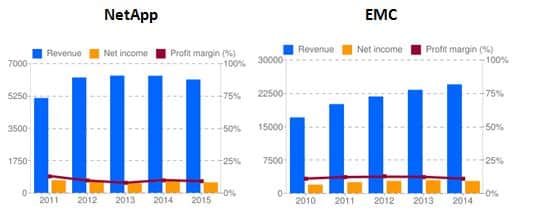Investing in the 5 Biggest Data Storage Companies
Table of contents
Table of contents

You may have heard the term “big data” being thrown around lately. This term refers to a metaphorical “black box” which contains extremely large amounts of useful data that we can glean information from using powerful analytics software. Why is all this data suddenly being gathered? It’s because some of the most exciting technological breakthroughs happen to require massive data storage. Take genomics as an example. Here is an estimate of the projected storage needed for genomics in 10 years’ time:
That need may be dwarfed in comparison to the needs of the Internet of Things (IoT) which will be enabling billions of small devices to communicate, each of which will require data storage. Analyzing all this data may start to use quantum computing soon, which will also utilize many copies of the massive data sets extrapolated from billions of sensors. Let’s also not forget about some of the biggest technology companies like Google, eBay, Amazon, etc. which require storage for their own needs or even “cloud storage” which is essentially storage that is rented to clients.
No doubt there are also many startups tackling data storage with more cost-effective ways to store data, but every single one of these applications still requires the actual data storage hardware. So which are the top companies actually providing the data storage hardware for “big data”? A 2013 market research report by Frost and Sullivan on “Global Storage” provides a comprehensive breakdown of competitor market share by revenues as seen below:
We can see that 5 companies command +70% of global data storage revenues; EMC (31.4%), NetApp (19.3%), Dell (11.9%), IBM (4.9%) and HP (3.5%). So which company is the best one to invest in? Investors could spend months trying to cherry-pick the winner in this group, or they could build a market cap-weighted portfolio of all four publicly traded companies as seen in the below motif:
Unfortunately, EMC (NYSE:EMC) is in the process of being acquired by Dell, a private company which retail investors cannot invest in. Assuming this acquisition takes place, then this leaves us with 3 stocks; Netapp (NASDAQ:NTAP), IBM (NYSE:IBM), and HP (NYSE:HPQ). We can rebuild the market cap-weighted motif as seen below:
With +80% of the portfolio weighted towards IBM, we need to know much exposure we get to data storage by investing in IBM. Data storage revenues for IBM fall under a reporting category called “systems hardware external revenue”. In Q3 2015, this category accounted for only 12% of total revenues. But this doesn’t mean that 12% of your investment will be entirely exposed to the data storage theme. “Data storage” is only a portion of this category for IBM and data storage actually declined -18% year-over-year with the Company stating that “storage continues to be a challenging market”. Investing in IBM solely for exposure to data storage just doesn’t make sense.
So what about Hewlett Packard (NYSE:HPQ)? The latest 10-Q filing for HPQ shows their revenues from storage clearly broken out and making up just 3% of net revenues. This number was actually flat year-over-year and did not show any of the growth you would expect to see from the emergence of “big data”.
This leaves us with one company left; Netapp (NASDAQ:NTAP). So is this $8.35 billion company a pure play for data storage? Here’s what they say they do:
We operate in one industry segment: the design, manufacturing, marketing, and technical support of high-performance storage and data management solutions.
That seems like a pretty accurate description of a pure-play data storage company. A quick look at the NTAP yearly financials in comparison with EMC shows us that margins in the data storage business are relatively low, and NTAP’s revenue growth seems to have plateaued:
Conclusion
So of the 5 biggest data storage companies there are by revenues, it seems that only Netapp (NASDAQ:NTAP) can provide investors with meaningful exposure to data storage at the moment. While data storage promises strong growth in the coming years, it’s a challenging market to be in. The cost of storage is always falling, and heavy R&D spend is needed to stay on top of the next hot data storage technology. In future articles, we’ll take a look at some interesting data storage startups that seem to be getting quite a bit of attention from venture capitalists. We’ll also take a look at the recent data storage IPO from Pure Storage (NYSE:PSTG).
Aside from PSTG and NTAP, do you know of any other pure-play stocks for investors who want exposure to data storage?
Sign up to our newsletter to get more of our great research delivered straight to your inbox!
Nanalyze Weekly includes useful insights written by our team of underpaid MBAs, research on new disruptive technology stocks flying under the radar, and summaries of our recent research. Always 100% free.



















